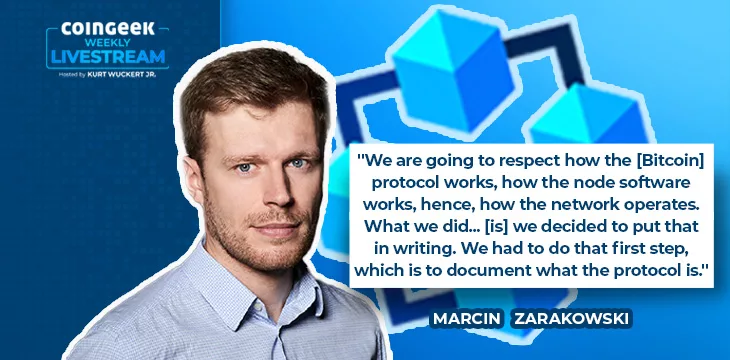On episode eight of the CoinGeek Weekly Livestream season four, Connor Murray and
Marcin Zarakowski from the BSV Association joined Kurt Wuckert Jr. on the weekly livestream. The topic was the new Network Access Rules (NAR), including how they came about organizing the rules, what they mean for BSV blockchain and more.
The Network Access Rules and what they mean
Murray begins the discussion by highlighting that there are clear definitions of nodes: they’re defined in the Bitcoin white paper. The Network Access Rules is basically a set of terms and conditions for nodes, defining honest and dishonest behavior, among other things.
While node software automatically rejects certain behaviors, e.g., double spending, this is limited. The NAR goes a step further and defines the rules. Those acting as nodes on the network agree to this contract.
Zarakowski adds that while experienced nodes understand what honest and dishonest behavior is, the BSV Association wants it in writing. It took a while to polish the rules and get everything in order. They’re binding on both nodes and the Association itself.
Isn’t the BSV Association just another Calvin Ayre entity that gives him even more power over the network? Zarakowski rejects this notion. It’s a Swiss-based entity, is audited as such, and members have voting power to decide matters.
Why does the Association exist? Murray says its fundamental purpose is to keep the protocol set in stone. It stops a development group from fundamentally changing things. He emphasizes that while the Association has been granted a stewardship role, it is also constrained by these rules.
The empty block miners and how these rules would deal with it
Wuckert recalls the incident of the empty block miner. He says that there was no easy way to contact other nodes, so he thought it would be wise to coordinate, pick a block, and stop building on theirs. He wants to know if this incident aided the decision to create the Network Access Rules.
Murray adds that to do so, the Association adopted the guiding principle that a transaction should be valid 1,000 years in the future. If a change alters that, it’s a protocol change.
Zarakowski highlights this point with an analogy: lego bricks from 30 years ago work fine with bricks created today. In situations like the empty block miner, the Association would reach out to verify what’s happening first, and they’d only take action if the disruption continued and negatively impacted the network. He emphasizes that it’s constrained by the rules, too, and it could face legal action if it acted too hastily or harshly.
Murray says that by not including transactions, the empty block miner breaks the contract it entered into as a network node. In the future, BSV will handle millions of transactions per second, and rules must be clearly defined.
Zarakowski says miners can mine on another blockchain if they don’t like the rules. They voluntarily agree to abide by them when they mine on BSV and are free to leave, too.
To hear more about the need for governance and its limitations, what the alert/contact process would look like, and the ridiculous conspiracy that Dr. Craig Wright is trying to steal Satoshi’s coins, tune into the CoinGeek Weekly Livestream using this link.
Watch: Teranode is the future of the Bitcoin network
New to blockchain? Check out CoinGeek’s Blockchain for Beginners section, the ultimate resource guide to learn more about blockchain technology.










